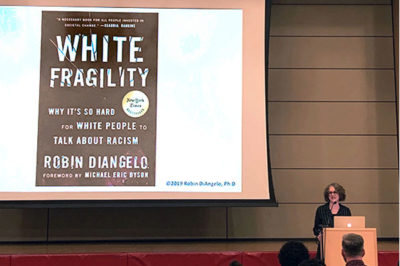“DiAngelo’s book and talk feel like the beginning of a real, vulnerable-but-safe and ONGOING conversation about race that everyone can (and honestly, must) be a part of. I know that the stirrings I felt while hearing her points and examining my own contributions to systemic racism are where the vibrations of change originate. What a powerful evening.” – Michelle Cashman, Elementary School parent
“It struck me that being multi-racial in a progressive environment means I have a big responsibility to bridge a white “dominant race” perspective and that of a person of color. And that belonging to more than one race does not exempt me from checking my privilege and biases.”—Anonymous
“As a person of color I feel like I’m always policing myself to not bring up racial issues around white people for fear of offending them. I’ve been in many situations where white people have gotten defensive or hurt when I’ve brought up the topic of racism and now I avoid sharing my experiences so as not to shut them down or make them angry. One small way I think we can start to change this racist system is by White people proactively bringing up these topics on their own thereby creating a space to talk openly about race.”—Anonymous
“I felt the truth of Robin’s words reverberating in my bones and with it my fear that the people of color in the room could be feeling hurt or angry. And I felt myself afraid of their potential hurt and upset and realized that I could stay away from that and everything can stay the same or I can move toward it with love and curiosity and maybe something will begin to shift.”—Rosemarie Dewitt, Elementary School parent
“My biggest takeaway from her work, as a white person, is that white fragility is a form of perpetuating dominance—deflecting the racial hurt that has occurred to focus on our reaction to being informed of the hurt. It’s a way of saying, my ability to move through the world with racial comfort is more important than your ability to move through the world without racial pain. I appreciated the emphasis on the idea that we all make missteps, it’s human, so the key thing is how we act when informed of the misstep—do we take it as an opportunity to heal the hurt and learn, or as an opportunity to establish that for us, healing and learning is optional?”—Abby Sider, Middle School parent
“As a Person of Color, it is refreshingly gratifying and affirming to witness a White person acknowledge and name the inevitable racist behaviors I am regularly subjected to by well-meaning White progressives who ‘voted for Obama,’ and presume they are racially literate. Last night’s VE event was revelatory!”— Anonymous
“I was most struck by DiAngelo’s comment—after an evening facing the challenges of taking responsibility for living in a racist society—that, in reality, this work is deeply rewarding. That’s my experience: dropping the burden and the guilt that come with denial is so freeing!”—Franz Metcalf, High School parent
“A very powerful presentation of the idea that we can’t change something we refuse to see, and of the observation that not having to address systemic racism and our role in keeping it alive and well is in fact the express purpose of that refusal. Dr. DiAngelo’s lecture and book should be mandatory for all prospective (and current) Oakwood parents.”–Ron Livingston, Elementary School parent


